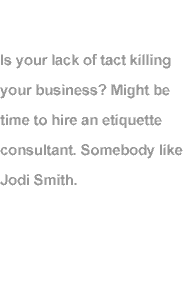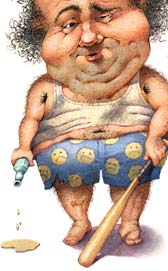 |
|
||||||||||||

|
|
||||||
|
By Diana Burrell
|
Are good manners a product of nature or nurture? If you met freelance etiquette consultant Jodi R. R. Smith's newborn daughter, you'd argue (politely, of course) on the side of heredity. During the hour that we spent in a noisy suburban coffee shop, Smith, a Boston-based IP, elucidated the finer points of thank-you notes and handshakes. The infant snoozed soundlessly in her carriage, peeping at us only once, and demurely, near the end of the conversation. But Smith confidently states that excellent manners are a matter of training, not of genetics. "If people can see the benefit of changing their behaviors," she says, "they absolutely can develop better manners." Becoming (Excruciatingly) Correct The 31-year-old Smith says she's neither a Boston Brahmin nor an ex-debutante, and she didn't attend finishing school, either. "Our family was solid middle-class American. We didn't have the silver laid out every night, but we knew what was expected of us and when it was expected. We knew the ramifications if we didn't behave properly." Shy as a child and teenager, Smith spent hours observing her peers. "It was interesting to notice what made one person popular and another person unpopular," she says. "And high school was a breeding ground for unusual behavior, which also gave me a lot to think about. What it came down to was that the popular kids had better social skills, and those were something anyone could learn." Then she discovered a book she affectionately calls her "Pink Bible": Judith Martin's Miss Manners' Guide to Excruciatingly Correct Behavior. "A whole world opened up to me with Judith Martin's book. I began reading etiquette books from cover to cover just for the fun of it." At the University of Rochester, Smith funneled her interest in human behavior into a bachelor's degree in motivational psychology. She went on to get a master's in industrial and labor relations from Cornell University, then began working in human resources. "In one company, I observed situations where managers and employees weren't getting along. What it came down to was not a lack of professional expertise, but again, a lack of social skills." Meanwhile, Smith continued to pore over the pronouncements of etiquette mavens such as Miss Manners and Letitia Baldrige, and became an expert in the subject. Friends, acquaintances -- strangers, even -- began calling her for etiquette tips. "They'd say, 'My brother-in-law is going to an interview, and they're taking him to lunch. He has no idea about forks. Can you help?' So I'd spend an hour with him, teaching him which fork went with what. Then I'd get another call: 'You don't know me, but someone who knows someone said to talk to you about my wedding.'" She saw an opportunity before her, and "that's when I decided to go into business," she says. Manners Make the Woman At first there were obstacles. When Smith founded her solo consulting practice, Mannersmith, in January 1996, she noticed that prospective clients either clamored for her services or simply didn't believe that an etiquette consultant could be worth the money. Smith also had to overcome the stereotype that a stickler for manners necessarily wears her hair in a tight bun and raps the knuckles of the raffish with a ruler. "Some companies understood immediately what I was talking about, and they couldn't wait to get me in. Other places would listen to what I'd have to say, and then they'd ask, 'Why do I want to do this again?' So I'd have to point out that if they have employees who can't interact with customers in a positive, polished manner, that this can affect the company's finances and future." Her first client was Boston University, where she cold-called the director of career services and set up a meeting. Four years later, the school still feeds her work. Smith recalls one client who didn't have to be sold on the importance of etiquette. "Her employees worked with customers over the telephone, but she had a situation coming up where the employees would be meeting customers face-to-face. Their social skills needed a lot of work, so this client asked me to give a presentation. I talked to them about the importance of standing up straight, making eye contact, and dressing professionally." After the event, the client reported that her employees performed flawlessly. "These small behavioral changes made a huge difference for this client's business," says Smith.
While it's nearly impossible to show how much impeccable manners can add to the bottom line, it's easy enough to describe the kind of indiscretion that might drive customers away. "When the phone rings and it's for the boss," says Smith, "you don't say, 'She's in the bathroom.' She very well may be in the bathroom, and she may have been in the bathroom for the past half hour, but does a client really need to know that?" No -- and the boss doesn't want the client to know either. That's the point. Rules of the Game From geniuses to grade-schoolers, from bridal parties to bar mitzvahs, Smith, who juggles seven to ten clients at a time, preaches that manners matter -- and she keeps her sermons entertaining. "Kids and college students are the most fun to work with," she says. She finds that children best understand the concept of decorum through sports analogies. "I ask them, 'Okay, when you're playing baseball and you hit the ball, which way do you run?' Everyone knows that you run to first base. But what if you want to run to second base first? Or third base? The kids all laugh and say, 'You can't do that!' So I ask, 'Are you telling me that the police are going to come and take me away if I don't play by the rules?' And the kids usually respond, 'No, the police won't take you away, but you have to run to first base first. Those are the rules!'" "I tell them that's what etiquette is all about. The police aren't going to come after you if you don't mind your manners, but you'll have a lot more fun in life if you do." Interestingly, this analogy also proved effective with her most critical audience, a skeptical crowd at a fall Mensa International meeting in Boston. (Mensa is a society open only to those with IQs in the top 2% of the population.) "They argued with me about how small talk was fake," she says, "so I had to spend the first 20 minutes of my presentation convincing them that when someone asks, 'How are you?' they're not looking for the truth; it's a social nicety. If you continually answer questions like that honestly with, 'Gee, I'm doing terrible; my back is killing me,' you'll forever remain a hermit." Challenges, Challenges Although Smith hasn't had to worry much about her own social skills (things like how to network at a conference or how to give a killer handshake), she's had her own hurdles to leap. "The hardest thing was setting up a good accounting system," she says. "The first year I was in business I kept receipts for everything -- and I mean everything -- in a Microsoft Excel spreadsheet. When tax time came in April, I met with my accountant. She took one look at my spreadsheet and said, 'This is the way you keep your books?'" With her accountant's help, Smith learned how to use Quicken, a software program that allows her to write checks, issue invoices, and monitor Mannersmith's cash flow. The E-quotient So, in what ways might IPs improve their EQ (etiquette quotient)? The way they (and just about everybody else) use email, perhaps. "Email can have a very casual tone," Smith says, "and that can be a problem for IPs who are looking to make a connection with a new client. Not using a formal title (such as Mr. or a Ms.) can be a turn-off for some people, so you need to err on the side of formality, even though email by nature is informal."
Thinking about sending a client a thank-you note via email? Big no-no, says Smith. "Unless you're in the computer industry, stick with a handwritten note on nice card stock." And no thank-you note at all? Smith shakes her head. "That's even worse. You're missing the opportunity to stick out from the masses who don't send them." Though she prefers pen to pixel when it comes to communications, her business has benefited from electronic interfacing. "I received a telephone call from an administrator at a private liberal arts college one day, and she was interested in having me speak to students about etiquette for everyday office situations. I'm always interested in how people learn about my business, so I asked her where she heard about me. She told me that my name had popped up on a college administrators' bulletin board on the Internet." She chuckles. "I never did find out who that person was who posted my name, so I couldn't thank her personally." The college has turned out to be one of Mannersmith's best clients over the past several years. Silver Spoons Proper table manners are an area of etiquette that many IPs worry about, especially when they're taking a Very Important Client out to lunch for the first time. Smith says the solution is easy. "Take a quick look around you. Is there someone there who has excellent manners? Follow what they're doing. Think of the scene in Titanic where "Unsinkable" Molly Brown (Kathy Bates) tells Jack (Leonardo DiCaprio) to use the silverware farthest away from his plate and move in from there. Watch and learn. Has Smith ever forgotten her manners? "That," says Smith coyly, "is something I'm not going to tell you." |
|||||||||||||||
|
June 5, 2000 Primary Editor: Eric Gershon Illustrator: Todd Bonita Production: Fletcher Moore |
We'd love to hear your comments about this article! Diana Burrell is a freelance writer who lives in the Boston area. If you like, we'd be happy to put you in touch with her, or with anyone named in this article. |
|||||||||||||||
|
|
||||||||||||||||



